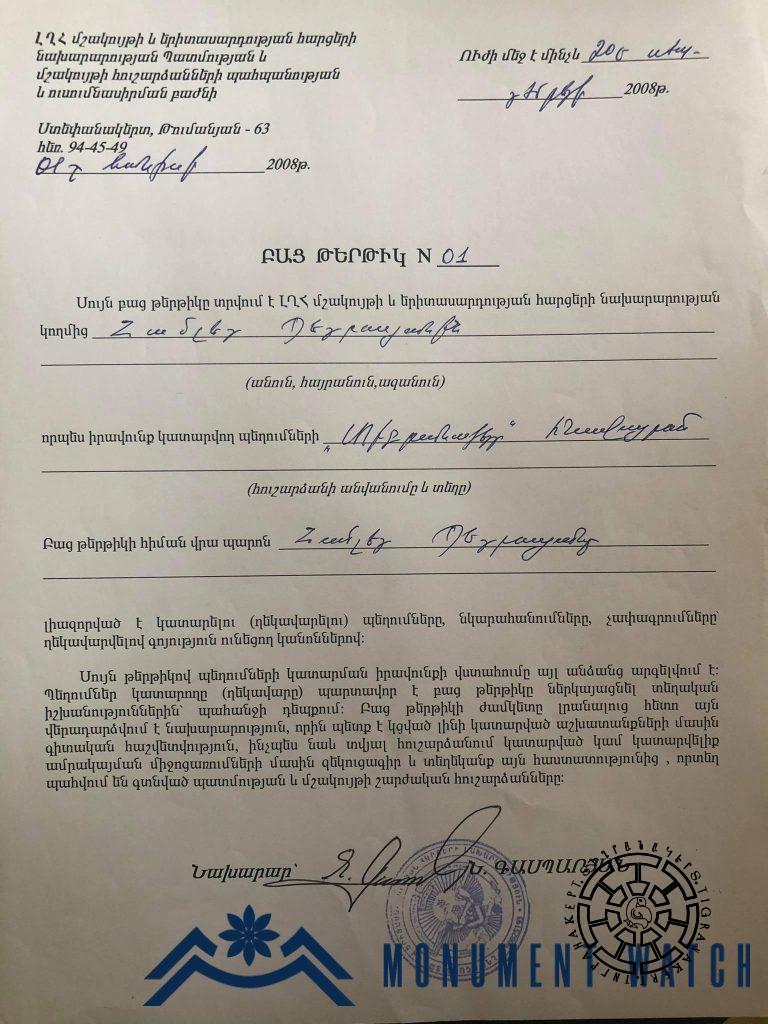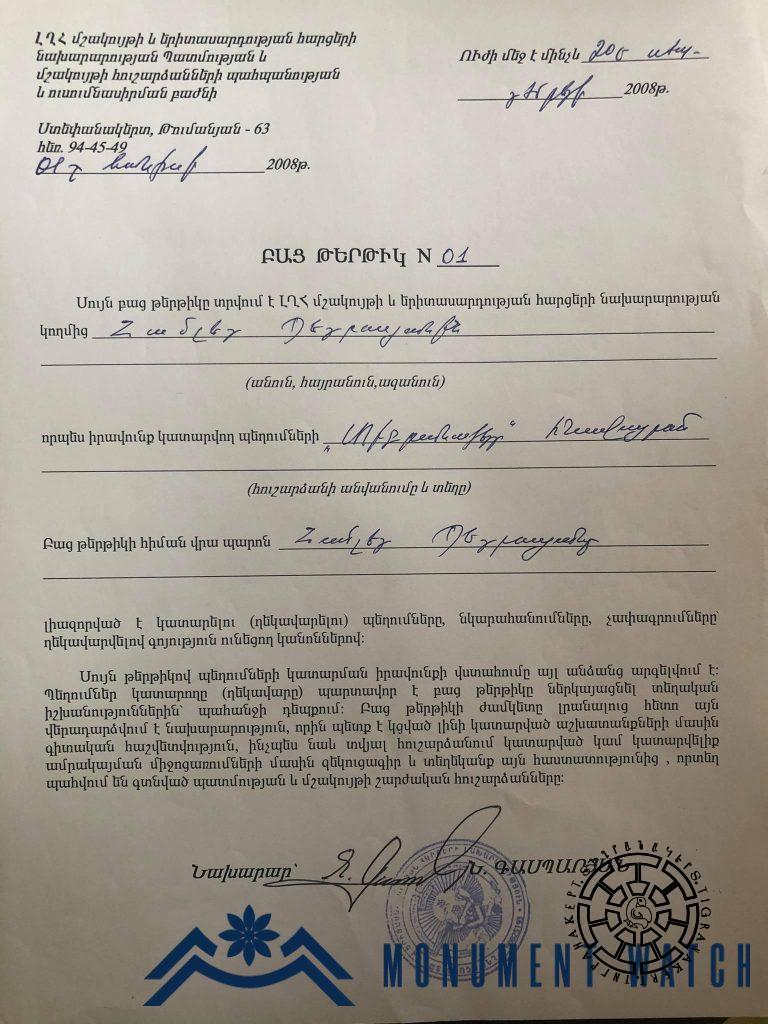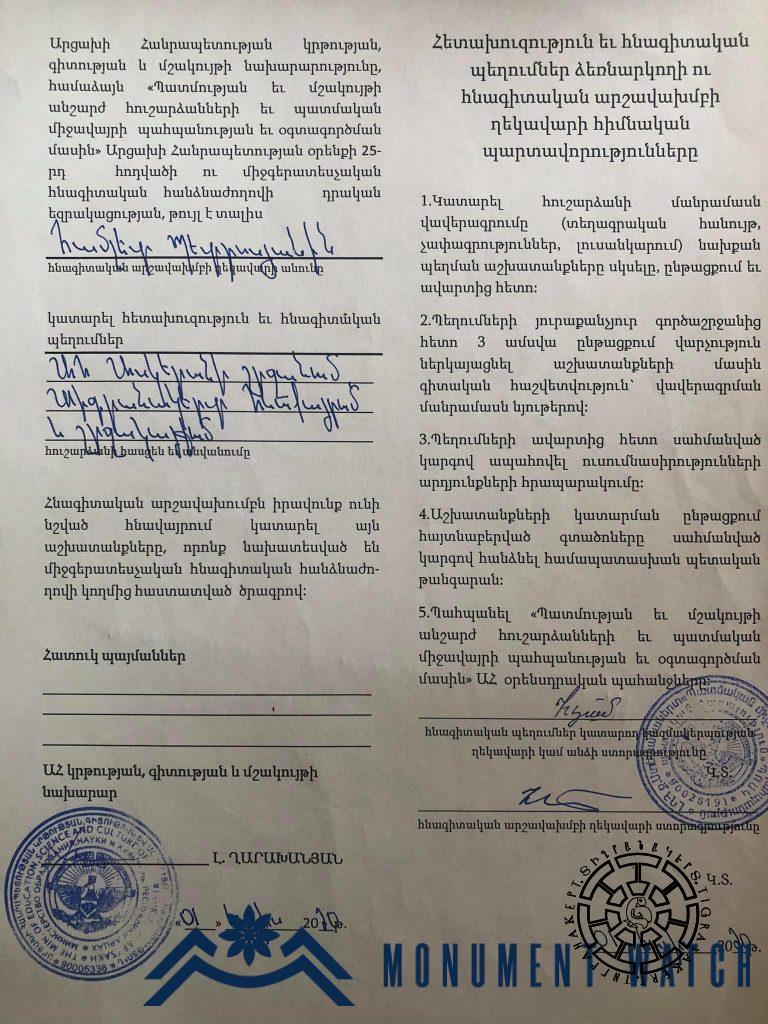
On February 25 one of the Azerbaijani news agencies prepared a report on the Agdam region. Part of it is dedicated to Tigranakert of Artsakh (starts from 3:25) ․
In that video the correspondent standing near the Fortress built by Panah Ali Khan, says: “I am in Shahbulag next to the fortress built in 1751 by Panah Ali Khan. This is the second fortress after Bayat. It has been in captivity for 30 years”.
The correspondent notes that despite the fact that the Armenians destroyed everything, they did not harm this fortress. The reason was that they possessed and appropriated it. “They declare that this is an Armenian fortress, they present it as a museum, as a historical monument. They exhibited Azerbaijani finds and various objects as Armenian there. Before surrendering Aghdam to Azerbaijan they stole all the exhibits, all the Azerbaijani exhibits, and took them away with them”.
The report says that the Armenian archaeologist Hamlet Petrosyan conducted excavations around the Fortress in order to falsify the history of these places, settlements, and Azerbaijani monuments. “The Armenian archaeologist told his media that during the archaeological excavations fragments of gold jewelry, towers and a number of other monuments related to Azerbaijani architecture were found. Everything was taken out to Armenia” (source:
In his video reportage, the journalist claims that the Armenians tried to Armenianize Shahbulag fortress of Panah Ali Khan, that is why they created a legend about Armenian Tigranakert. In March Hikmet Hajiyev – the Foreign Policy Advisor to the President of Azerbaijan, who organized a press tour for journalists of various Azerbaijani media and bloggers to Aghdam, (including Tigranakert), posted on his Twitter: “Shagbulag, Aghdam. Falsified mythic story about Tigranakert is over”. The publication was distributed among all Azerbaijani news agencies (source: https://www.youtube.com/watch?v=vj-804VI1dU) The same idea was voiced by Rizvan Huseynov in a reportage filmed at the ancient site of Tigranakert, pointing to the “evidence” (source: https://www.youtube.com/watch?v=3ujCWAUK0B8&t=100s)
Our information:
Of course, Shahbulag Fortress of Panah Ali Khan and the mosque built near the water sources have nothing in common with Tigranakert. They were built in the middle of the 18th century, when Tigranakert no longer existed, and a large ancient city was lying in ruins in this area. The Government of Artsakh and the archaeological expedition of Tigranakert cleaned the territory, conserved and preserved the site. The Fortress, which was used as a restaurant during the Soviet period by Azerbaijan, was turned to a museum by us. The archaeological evidence of Tigranakert – the ancient fortress and the residential quarters, the square and burial mounds of the early Middle Ages, and other buildings of the city discovered during excavations, don’t refer to the buildings of the 18th century. Geographically, they do not adjoin either the Fortress of Panah Ali Khan or the mosque (see: https://monumentwatch.org/monument/tigranakert/).Hamlet Petrosyan and the members of the expedition studied Tigranakert and published the results of their research. It’s impossible to mention a publication where the buildings of the 18th century are presented as Armenian. We only hope that at least one Azerbaijani scientist or any educated person will first realize this simple truth and only then will begin to spread the myth of “Armenization”.
We would like to remind the semi-literate propagandists of the aggressive state that the archeological excavations in Tigranakert were carried out at the official invitation and with the permission of the Artsakh authorities, that every year the archeological commission within the Artsakh government issued a special permit, so called an open list, to the leader of the expedition (see photos of some of those permits) that the excavations were financed from the Artsakh state budget. The Tigranakert Archaeological Museum was established, operated by the decision of the legitimate authorities of Artsakh, with funding of the government of Artsakh. The archeological research of Tigranakert was carried out on a full legal basis, with high professionalism, the results of the research were regularly presented to the international scientific community. It’s just ridiculous to talk about a secret process.
Let us mention that Azerbaijani archaeologists, who worked in the area in the 60s and 80s of the last century, did not see the archeological traces of the old city. I urge them not to be so jealous of what they have not been able to find.
During the 44-day war, Tigranakert became an area of enemy shelling, about which we have warned more than once. As a result, the Tigranakert archeological site were completely destroyed. The Artsakh authorities and I, our research team, could not allow the Tigranakert Archaeological Museum to suffer such a fate. The archeological findings of Tigranakert are the property of the people of Artsakh, the issues of its protection are not within the competence of Baku, but Stepanakert. In case of peace, they will be returned to Stepanakert and will be exhibited in the museum to be created for it.
The fact that Artsakh is not politically recognized does not deprive its indigenous people of their right to culture. Including the right to research and promote cultural heritage. So, the archeological research of Tigranakert was carried out on an absolutely legal basis.
The Azerbaijani ideology of depriving the people of Artsakh of their cultural heritage is a continuation of the genocide of the Armenian cultural heritage. Genocide, which we have witnessed for decades, genocide, which culminated in 2005-2006 by destruction of thousands of khachkars in Jugha, the genocide that gained momentum during Azerbaijan’s and Turkey’s recent aggression, continues every day. And it cannot be justified by false political statements and false accusations.
We will continue the research of Artsakh’s cultural heritage, its popularization and the revelations of Azerbaijani vandalism. Aggression, military domination, defamation of international bodies are not competent, can’t deprive the people of Artsakh of the right to preserve their identity with their cultural heritage.

